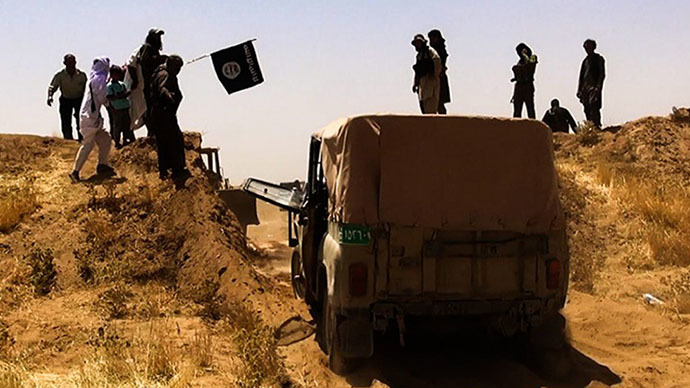'There is no force that could stop ripping Iraq to shreds'

It would be totally disastrous and catastrophic if ISIS creates an Islamist jihadist political space in Iraq and Syria, with Iraq being on the verge of falling apart, author, blogger and journalist Matt Carr told RT.
RT:After leaving Iraq, the US left lots of weapons in the country. Could these now fall into the hands of ISIS?
Matt Carr: Very probably. A lot of weapons have been left in the country, and not only left by the US. Many weapons were accumulated by the Iraqi resistance that fought the US during the occupation. So the country had a lot of weapons even before the Anglo-American occupation, but obviously by the time it ended there were a lot more. Very probably they could have found a way into the hands of Baathists.
RT:Let’s not forget the US also trained anti-Assad forces who later became ISIS fighters. Was it impossible to predict something like that could happen?
MC: I do not know if it was possible to predict so easily that ISIS would end up with such a strong presence in Iraq. I think we should also remember when we are talking about ISIS in Syria, that ISIS was one of the many Islamist groups of extreme Salafists jihadist ideology, one of at least 11 or 12, there have been various attempts to unify these movements, and various groups have come and gone. ISIS is the latest. There are some stories in the press to suggest that the US may have provided training to some of these Jihadist groups in Jordan, beginning in early 2011 and late 2012, but the evidence is not actually entirely conclusive. If that did happen, it would belong to a historical pattern that the US has in the past facilitated and funded this kind of group in order to pursue its foreign policy agenda. I would also point out that some of these groups may also make part of the indirect blowback from the Assad regime itself, because Assad released hundreds of jihadists in the early days of the rebellion, and some of the jihadists turned very quickly against him and also expanded their reach region beyond Syria in ways that Assad himself did not anticipate. If we are talking about ISIS forming blowback, it is very probable that it was, but there are many different actors that may have been responsible for that blowback, not only the US.
RT:Lots of experts say the US is getting into conflicts without thinking about regional or cultural aspects. How can you explain such a short term view? Is it just because it’s all happening too far from America’s borders?
MC: When looking at American foreign policy it is very difficult sometimes to sort out what is rational and what is irrational, what is actually short-term reason and what is long-term reason. There is a theory for example that I do not actually subscribe to, that suggests that ISIS was deliberately created by the US with the objective of fragmenting and disintegrating Iraq in order to justify partition into three little statelets. I do not think the US has that kind of long-term vision. If ISIS did have any connections with the US, for example through military training programs in Syria, then the fact that it is becoming so powerful in Iraq now is an incontrovertible consequence of this policy.
To be honest, I think very few experts can actually sort out when they are looking at the US foreign policy exactly what is short-term and what is long-term, because sometimes if you take a long-term conspiratorial view, incompetence with which foreign policy is so often conducted doesn’t support longer-term so-called conspiracy theories such as I have mentioned about the partition of Iraq.
RT:What consequences will the rise of ISIS have?
MC: Another thing that we need to bear in mind with ISIS is that ISIS is not just a creation of the Syrian war. ISIS has its origins in Iraq itself, in the jihadist resistance to the US occupation. So when the US withdrew their troops from Iraq there were a view that one of those groups had been defeated or at least neutralized. We now see that this has probably never happened, and ISIS has been empowered in Iraq not just because of what happened in Syria – that is obviously a very important factor – but also by the incompetence, sectarianism and corruption of the Maliki government in Iraq.
All these different causes have created a situation in which it is very probably Iraq could fragment into three statelets whether the US intended that or not. I think it could happen because I can’t see for the time being any kind of sectarian movement that could overcome a division that is ripping Iraq to shreds. That is obviously a catastrophe for Iraqis most of all, but if it is also a power collapse in Iraq itself, it is almost certainly going to spill over and suck in surrounding countries, and it will act as a kind of a vortex. If ISIS succeed in creating some kind of Islamist Jihadist political space in Iraq and Syria that would be a dream that those kinds of movements have pursued ever since the mujahedeen first fought against the Soviets back in the Afghan war. The consequence of this is totally disastrous and catastrophic.
The statements, views and opinions expressed in this column are solely those of the author and do not necessarily represent those of RT.
The statements, views and opinions expressed in this column are solely those of the author and do not necessarily represent those of RT.












